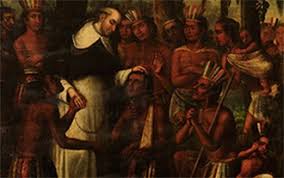Bartolomé de las Casas: An Early Voice for Justice
By Rev. Omar Gonzalez, Member of the Presbytery's Anti-Racism Committee (ARC)
|
When we see injustices in society, we are faced with a choice. Often this choice comes with a cost. A similar choice faced Bartolomé de las Casas, a young landowner living in the ‘new world’, born in the fifteenth century in Spain. He was an eye witness to a turning point in history. His father and two uncles accompanied Christopher Columbus on his second voyage in 1493. He also witnessed the return of Christopher Columbus in April 1493 parading through the streets of Seville with great pageantry accompanied by native Tainos. He eventually departed for the Santo Domingo with his father looking forward to a life of adventure and fortune.
It was in the so called ‘new world’ that his life would forever change. Bartolomé would become an eyewitness to atrocities and injustices committed against the indigenous people and would become an outspoken advocate for indigenous rights. This was a gradual conversion that did not happen overnight. The governor of Hispaniola gave Bartolomé an encomienda, a royal colonial right to forced labor from the Indigenous inhabitants. He farmed and lived a prosperous life. He was also an ordained priest, and continued celebrating mass. Yet he began to be influenced by the preaching of Dominican friars who pointed out the unethical gains made by forced slavery. Finally, when reading the text of Sirach 34:21–22, 25-26 for a sermon he was going to preach on Pentecost Sunday, he experienced a conversion. The text reads, ‘The bread of the needy is the life of the poor; who deprives them of it is a man of blood. To take away a neighbor's living is to murder him; to deprive a laborer of his wages is to shed blood'. 1 This was the start of his advocacy, lobby, and preaching to bring to light the injustices of the encomienda system and for new laws that would protect the rights of the native indigenous people. He went on to preach the sermon on August 15, 1514, where he told his audience he was giving up his encomienda. He returned to Spain where he began his work on behalf of the indigenous people. Las Casas would go on to have many highs and lows in his efforts to bring to the attention of people the injustices that were being committed. His published works include the Brief Account of the Destruction of the Indies and In Defense of the Indians. Part of his challenge was to convince colonists, governors, and administrators of the need to treat the indigenous people with dignity. He also understood the need to end the forced conversion to Christianity of the native peoples. Las Casas also pointed out the root of the problem, he was critical of Christopher Columbus' policies that began the use of slave labor and the encomienda system in order to make the journeys to these territories profitable. He wrote, “The Indians were to serve the Spaniards, using every man, woman, child for their maintenance and for other personal services. From that originated the plague of repartimiento and encomienda –– assigning and controlling Indians –– a plague which has devastated, consumed the Indians entirely. Slaves were the primary sources of income for the Admiral. With that income, he intended to repay the money the King were spending in support of Spaniards on the Island. Then provide profit and income to the Kings.” 2 Las Casas was vilified by many. He was considered a traitor to his country. He was accused of exaggerating the conditions of the native people, and he continued to face resistance for most of his life. Yet his words are as powerful today as they were when he first penned them. He forcefully argued that it was not the natives that were in need of conversion but rather the Spaniards. He wrote of the need to repent of “… that recent blindness of understanding which for the last seventy years has proceeded to shock and scandalize and rob and kill those people overseas.”3 What injustices today do we as Christians continue to perpetuate? In what ways do we stay silent and continue to place gold above God? These are questions las Casas words still prompt us to ask. Christ did not come into the world to die for gold- Bartolomé de las Casas Sources: 1. Sirach quote from United States Conference Catholic Bishops https://bible.usccb.org/bible/sirach/34 2. Bartolomé de las Casas, Indian Freedom: The Cause of Bartolomé de Las Casas 1484-1566 A Reader. Trans. Francis Patrick Sullivan. (Kansas City: Sheed & Ward, 1955) 60. 3. Ibid. 8-9 |
